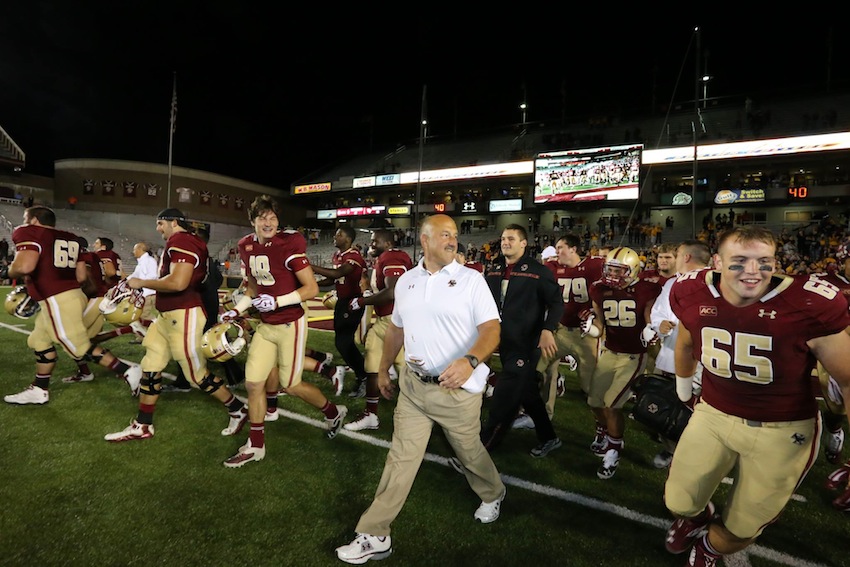PETA Continues to Peck At Boston College Over Use of Live Bald Eagle Mascot

Photo via Boston College Athletics on Facebook
When it comes to Boston College using a real bald eagle as their mascot during home games, officials from PETA won’t let the ball drop.
On Monday, the animal protection organization sent a letter to Neil Mendelsohn, acting Special Agent in charge of the U.S. Fish and Wildlife Service, asking the agency to investigate Boston College’s use of a live bald eagle as the school football team’s official representative.
On August 28, BC announced that, for the first time in 50 years, they would use the bird as a mascot, and that it would make regular appearances at all home football games during the 2013 season. The Newton-based Catholic school renewed its partnership with Zoo New England and the World Bird Sanctuary to bring back the tradition.
But PETA claims the use of the eagle goes against federal law, specifically the Bald and Golden Eagle Protection Act, and the Migratory Bird Treaty Act. PETA representatives said using a live animal as a mascot can cause them to become easily frightened, or even injured, during “boisterous and almost unbearably loud” football games. “[It] has nothing to do with school spirit and everything to do with disregarding the basic protections that these birds are afforded under federal law,” said PETA Foundation Director of Captive Animal Law Enforcement Delcianna Winders. “Boston College just flunked Ethics 101 by teaching students that it’s fine to exploit, disrespect, and terrify animals—while flouting the law.”
While PETA pushes for a federal investigation, officials from the school claim they are not in violation of the law, due to their partnership with the zoo, and the use of “experienced handlers” who care for the eagle. “During the two games this season, experienced handlers from Zoo New England and the World Bird Sanctuary have made presentations to our fans regarding the importance of wildlife conservation and protecting endangered species,” said BC Spokesman Jack Dunn, in a statement sent via email. “Contrary to assertions from PETA, no part of the Bald and Golden Eagle Protection Act, or Migratory Bird Act, was ever violated. The World Bird Sanctuary has both federal and state permits to have the eagle in its possession and to conduct the educational display. The safety and wellbeing of the eagle remains the priority of all groups involved.”
In a letter to federal officials, urging them to investigate the matter, however, Winders said the Boston College Athletics program doesn’t qualify for a permit to exhibit eagles, and they are not covered because a permit possessed by Zoo New England, or the World Bird Sanctuary, is non-transferable.
Winders wrote:
Only those who are ‘under the direct control of the permittee, or who [are] employed by or under contract to the permittee for purposes authorized by the permit, may carry out the activity authorized by the permit.’ The U.S. Fish and Wildlife Service’s own interpretation of the regulation requires that anyone even assisting in permitted activities—such as a college displaying an animal at its games—independently possess a permit or be specifically named as a sub-permittee. Any contract allowing the college to molest the eagle for the purpose of promoting a sports team would therefore amount to an illegal ‘assignment or transfer’ of the permit.
The college has only used the bird at two home games so far, after doing away with the traditional costumed mascot that served as an accessory to the cheerleading squad. BC maintains that there is an educational aspect to the use of the animal.
There was no immediate indication as to whether federal officials would launch an investigation into the school’s use of the mascot at the behest of the animal rights organization, and whether PETA’s claims are consistent with the laws set forth by the U.S. Fish and Wildlife Service.


